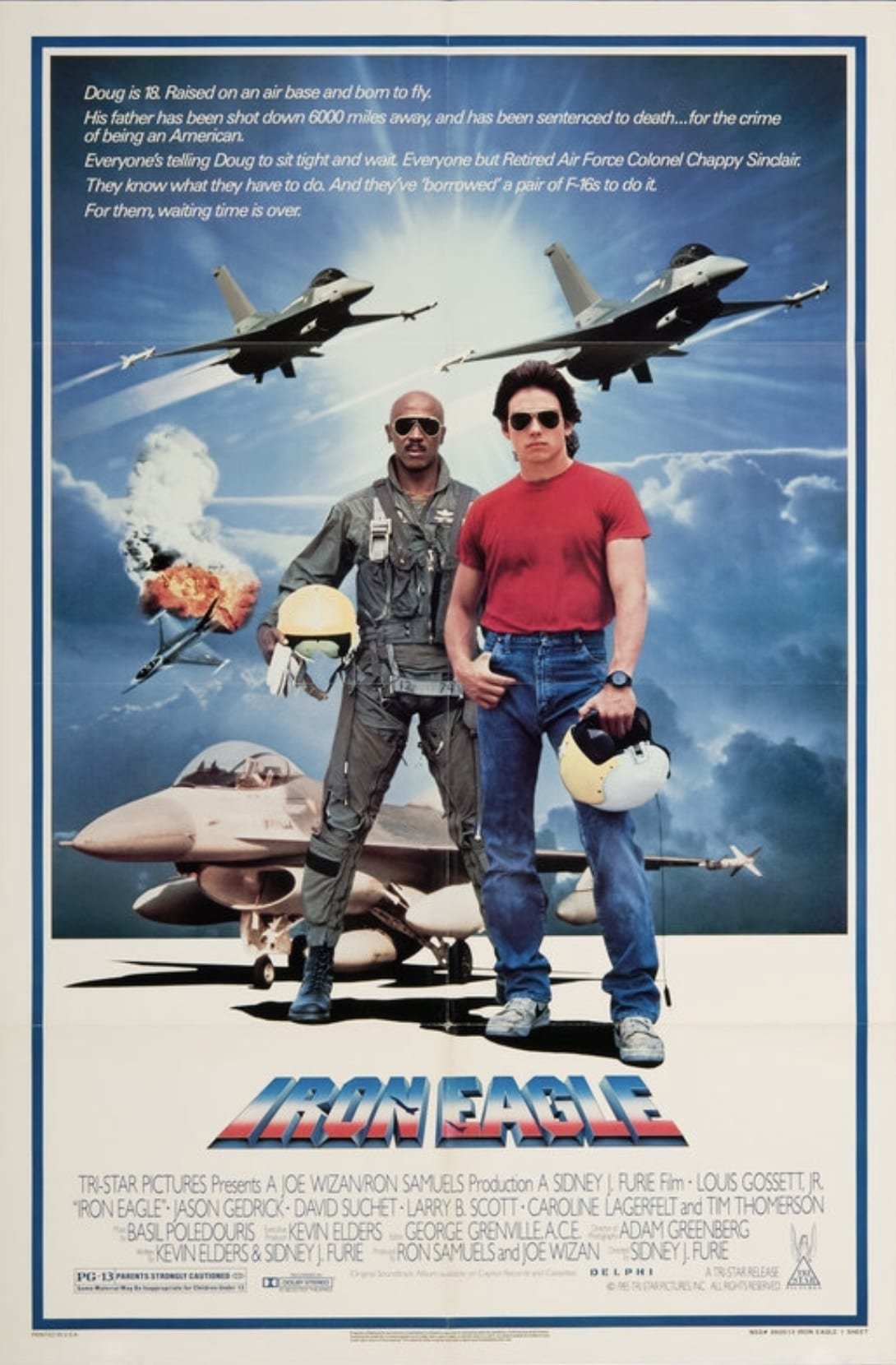1986 was the year that a film about a rebellious jet pilot took the world by storm to become the top-grossing movie both in the United States and worldwide. That movie… was not Iron Eagle – it was Top Gun, ya dummies! What many don’t realize, however, is that Iron Eagle was released nearly half a year before the movie that turned Tom Cruise into an international superstar. It’s highly doubtful that Iron Eagle influenced Top Gun’s in any capacity, but never forget that “the little jingoistic jet film that could” actually preceded the far bigger name.
Iron Eagle is about a high school senior named Doug Masters who longs to follow in the footsteps of his Air Force colonel father. Doug has a devoted group of friends (including “original Stiles” from Teen Wolf), a loving girlfriend (Melora Hardin, who played Jan in The Office), and a supportive family, but his dream of being an Air Force pilot like his father is shattered when his application to the academy is declined. Perhaps the military didn’t care for his habit of recklessly driving through town while listening to hair metal power ballads at deafening volumes.
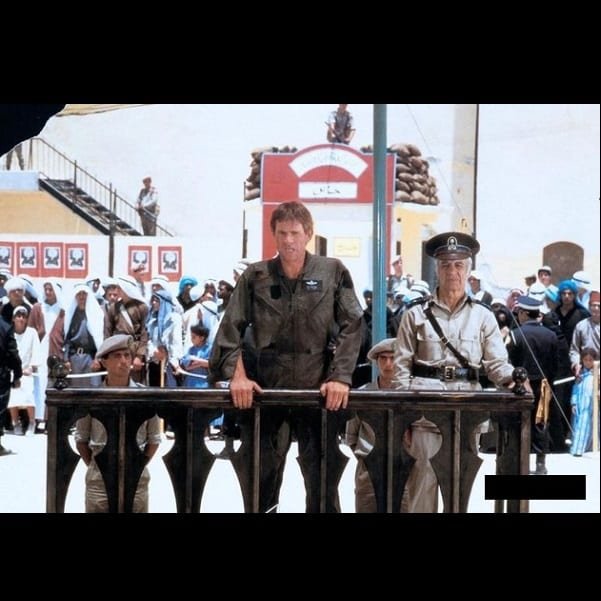
Tape Deck Hero
Music plays an important role in Iron Eagle. Well, to be more accurate, it wants to play an important role. Much like the protagonist of Baby Driver, Doug relies on a carefully-curated soundtrack to accompany his actions at all times. Whether he’s nearly hitting pedestrians in his car or dueling the town bully in a plane-versus-motorcycle race, Doug always has his gigantic cassette tape deck ready to strap to his thigh, which makes him look like some sort of mall-obsessed cyborg when combined with his leather jacket and sunglasses.
Just as Doug is beginning to recover from his rejection from the Air Force, he learns that his father (Tim Thomerson, star of Full Moon’s head-scratchingly weird Dollman series) was shot down and captured by jet fighters from the fictional country of Bilya (bet ya can’t figure out what country that’s supposed to be like!) while on a routine training machine over international waters. The Bilyans hold a kangaroo court for the American Colonel and announce that he will be executed in three days. The phrase “American dog” is heard frequently whenever the Bilyans are on-screen, in case any viewer doesn’t dislike them enough for murdering an innocent man.

Doug is unable to convince the military to take any action, despite the movie spending much of its first hour convincing the audience that America doesn’t take crap from anybody ever since “Ronny Rea-gun” replaced “Mr. Peanut” as president. Even Doug’s father’s close friend, Colonel Blackburn, can’t convince “Admiral What’s-His-Nuts” to do anything about the hostage situation. Doug does, however, earn the sympathy of a former Vietnam pilot named Charles “Chappy” Sinclair, who is now part of the Air Force reserves and spends his free time repairing aircraft.
We're Not Gonna Take It
Chappy initially rebuffs Doug’s request for help, but ends up agreeing because, as he says, “something about maniacs messin’ with good men always pisses me off!!”, although five seconds after reciting this line with seething anger, Chappy starts goofily shaking his butt to a James Brown song. It should be noted that Chappy is played by Louis Gossett Jr. – an Oscar-winning actor who is frankly too good for this movie. Gossett lends Chappy a fair amount of humanity, though his dialogue tends to be either angry lecturing or sadly reflecting on past losses.
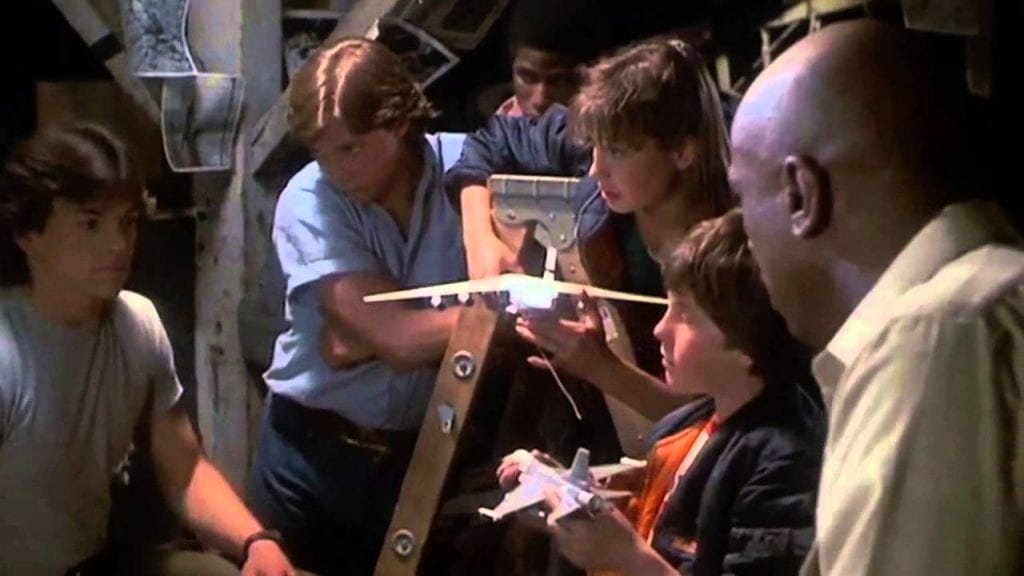
Now with a disgruntled veteran on board, Doug sets his plan into motion. And what a plan it is, involving getting his military brat friends to hack computers within the Air Force base and emotionally manipulate their parents’ friends and coworkers in order to obtain classified data pertaining to the Bulyan base in which Doug’s father is being held. Phase two of the plan is to falsify documents that would allow them access to not one, but two F-16 fighter jets – one for Chappy, and one for Doug, for the rescue operation. The final phase is the riskiest, with the kids causing a big enough distraction to allow Doug and Chappy to fly the stolen F-16s most of the way to Bulya before the Air Force base realizes they’re gone.
Doug and Chappy make their way to Bilya and attack an airfield while making demands to the Libyans to release Doug’s father. Under the impression that they are being attacked by a full squadron of jets, the Bilyans retaliate with full force, and while the heroic duo are able to take out all of their primary targets, Chappy’s jet is hit by an anti-aircraft cannon and suffers engine failure. The movie not-so-subtly hints at Chappy’s fate earlier in a scene in which Chappy gives Doug his first Air Force medal and a cassette tape to play if anything goes bad. Things go bad as expected, and Chappy’s jet crashes into the ocean.
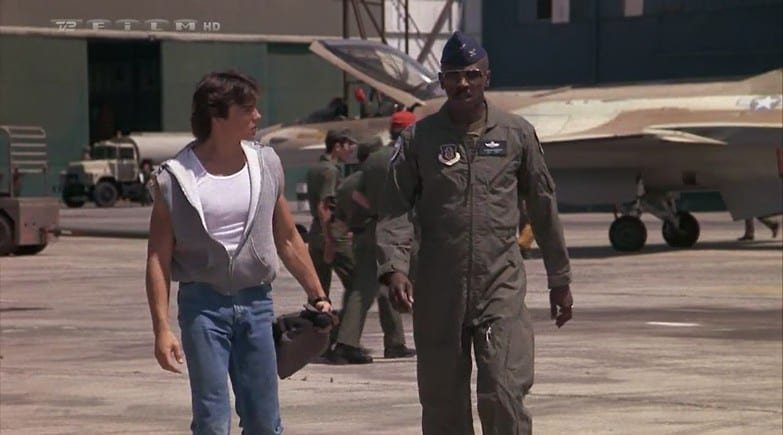
“Great, kid. Don't get cocky!”
Doug listens to Chappy’s cassette tape, which is a mixture of fatherly encouragement and instructions on how to tackle the remainder of the mission. With a newfound sense of confidence (not to mention a healthy dose of bloodlust), Doug hits play on his tape deck and attacks the base where his father is being held captive. After marauding the base with bullets, missiles, and even napalm, Doug is able to land his jet just long enough to get his father on-board.
In the trope to end all tropes, the evil colonel in charge of the base turns out to also be an ace fighter pilot himself, and he wastes no time in hopping into his own fighter jet to go after the escaping father and son. Doug shows off all of the evasive maneuvers that he secretly practiced with his father on the Air Force base and manages to shake off his adversary’s attacks long enough to eventually get behind him and blow him to smithereens with a lock-on missile after a couple of cliched vulgar exchanges.
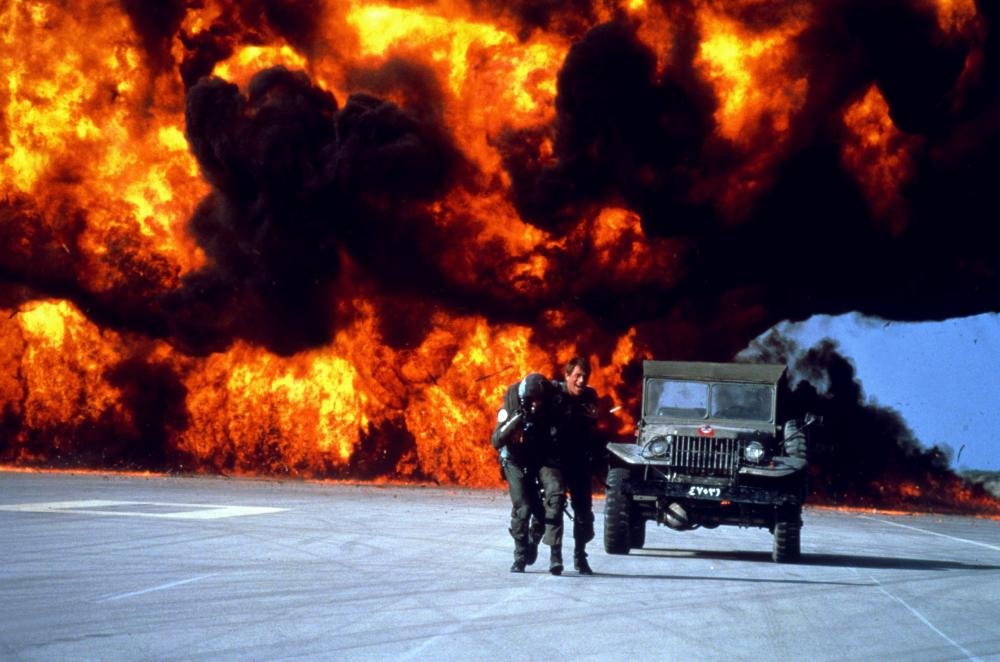
Doug and his father encounter a group of American fighter jets from a nearby American base and are escorted there, where they find out that Chappy safely ejected his jet and swam to shore. Unfortunately, there is still the itsy-bitsy little matter of treason that Doug and Chappy have to deal with after stealing classified data, sabotaging an American base, and stealing two (and destroying one) incredibly expensive fighter jets.
All ends conveniently, however, with the military panel deciding that the story would be an embarrassment to the Air Force if it were to go public. Chappy even gets one more impassioned speech (they got their money’s worth), convincing the panel to admit Doug to the academy. The movie ends with Doug reuniting with his friends and family while the media cheers him on, even though they don’t seem to know why. Cue the titular King Cobra song!

A True Maverick
Given the enormous disparity in box office revenue, you might assume that Iron Eagle is vastly inferior to Top Gun, but the movies are surprisingly not far apart in quality. Top Gun certainly did a better job of tapping into the zeitgeist of the mid-’80s, making stars of its young cast in the process, but Iron Eagle has a fun story, well-edited aerial action, and a licensed soundtrack with some very recognizable bands, such as Queen and Twisted Sister. It’s all directed competently by Sidney J. Furie (if you're born with a name like that, I think you have to direct action films) and has a decent musical score by Basil Pouledoris (Robocop, Conan the Barbarian).
Iron Eagle’s biggest problem is that it doesn’t quite know what type of movie it wants to be. The first third is about rambunctious, rebellious kids, and definitely has a bit of a Rad vibe to it. The middle section is something of a kid-friendly heist film with some Karate Kid-inspired moments of mentorship between Doug and Chappy. The final third is just a straight-up action movie, that, while rather uninspired, is totally watchable. For as far as the movie veers into total fantasy, it’s unfortunate that it takes itself so seriously by the end. Still (and I’m sure I’ll get a lot of flack for this), I’d rather watch it than Top Gun!

